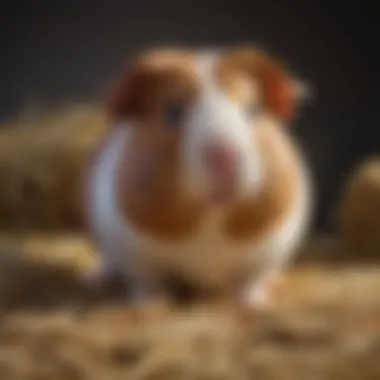Nutritional Essentials for Healthy Guinea Pig Diets


Intro
Guinea pigs are often cherished pets, known for their playful nature and affectionate behavior. As a pet owner, understanding their nutritional needs is essential for their health and well-being. An appropriate diet directly influences their longevity and quality of life. This article will cover key foods that affect the nutritional balance necessary for guinea pigs, addressing critical components like hay, fresh vegetables, and pellets. Additionally, it will clarify the role of vitamin C in their diet, highlight common misconceptions about feeding, and provide insights into proper feeding practices. By understanding these aspects, you can make informed decisions and ensure your guinea pig thrives.
Understanding Your Pet
Understanding your guinea pig goes beyond simply knowing how to care for them. It involves grasping their unique needs, behaviors, and traits.
Pet Behavior Basics
Guinea pigs display a range of behaviors that signify their mood and health status. They are social animals that thrive in pairs or small groups. Observing their interactions can help you understand their emotional state. When content, they often make a purring sound. In contrast, signs of distress include loud squeaks and hiding. Regular interaction not only encourages physical fitness but also nurtures their mental well-being.
Common Breed Characteristics
Several breeds exhibit distinct characteristics. For instance, the American guinea pig is smooth-coated and easy to groom. The Abyssinian breed has a unique rosette pattern in their fur. Understanding these traits can aid in tailored care. Different breeds might also have varying health issues they are prone to, necessitating close attention.
Species-Specific Needs
Guinea pigs have specific dietary requirements that must not be overlooked. Their digestive systems are uniquely designed to process fiber-rich foods. This underscores the need for an appropriate diet that includes ample hay. Additionally, fresh vegetables and the correct type of pellets are necessary. Awareness of these needs helps prevent common health problems such as digestive issues and obesity.
Nutritional Foundations
- Hay: This is crucial as it provides the necessary fibers for proper digestion. Timothy hay is an excellent choice, keeping teeth healthy and encouraging essential chewing behavior.
- Fresh Vegetables: Incorporating leafy greens like romaine lettuce and bell peppers ensures they receive important vitamins and minerals. Vitamin C is vital, as guinea pigs cannot produce it themselves.
- Pellets: Look for high-quality guinea pig pellets. Ensure they are fortified with vitamin C while avoiding those that contain excessive seeds or nuts, which can be harmful.
A balanced diet with hay, vegetables, and proper pellets is critical for a healthy guinea pig.
Feeding Guidelines
Establishing a routine is essential. Guinea pigs should have constant access to hay, and fresh vegetables should be provided daily. Pellets can be given in moderation, ensuring they do not consume excessive calories. Proper portion sizes depend on the age, weight, and health of the guinea pig. Always observe their behavior and adjust feeding practices as needed.
Grooming and hygiene practices are equally important, contributing to their overall health. Regular brushing can minimize shedding, while maintaining a clean environment prevents infections.
Epilogue
By understanding the fundamental nutritional requirements of guinea pigs, pet owners can offer safe and healthy diets that promote well-being. Regular monitoring of their diet, behavior, and overall health is key to ensuring a happy and thriving pet.
Understanding Guinea Pig Nutrition
Understanding the nutritional needs of guinea pigs is crucial for their overall health and well-being. Unlike some pets, guinea pigs have unique dietary requirements that directly impact their physical condition and longevity. It is important to understand these needs to provide a balanced diet that supports their digestive health and prevents diseases.
Guinea pigs are herbivores. This means they primarily thrive on plant-based foods. Key components of their diet include hay, fresh vegetables, and specially formulated pellets. Each of these food types serves different roles in maintaining their health.
The Digestive System of Guinea Pigs
The digestive system of guinea pigs is particularly specialized. It includes a large cecum that plays a vital role in fermenting and breaking down fibrous materials. However, their digestive systems are delicate and sensitive to sudden changes in diet. This means pet owners must be mindful of any dietary transitions.
Guinea pigs rely heavily on the fiber present in hay, which aids in their digestive process. If they do not have enough fiber, they can suffer from various gastrointestinal issues. Regular chewing and the natural grinding of food help keep their teeth healthy as well. Since guinea pigs’ teeth grow continuously, proper diet is crucial.
The Role of Fiber in their Diet
Fiber can be considered the cornerstone of a guinea pig's diet. It plays a significant role in maintaining digestive health. High-fiber foods prevent issues like bloating and constipation. Grass hay is the most important source of fiber. It promotes proper digestion by supporting gut motility.
Moreover, fiber contributes to dental health. Chewing fibrous material helps to naturally wear down their teeth, preventing overgrowth and associated problems. It is essential to provide a consistent source of high-quality hay, like Timothy hay or Orchard Grass hay, to optimize their health.
Benefits of Fiber


- Aids in digestion: Supports normal gut function, prevents gastrointestinal problems.
- Dental health: Promotes wear on teeth, reducing the risk of dental issues.
- Weight management: Encourages healthy weight by providing volume without excessive calories.
Water: An Overlooked Essential
Water is often a neglected part of guinea pig nutrition. Many pet owners may not realize how crucial it is. Dehydration can lead to serious health problems. Guinea pigs should always have access to fresh, clean water. This ensures proper hydration, especially when their diet includes dry foods like hay and pellets.
They prefer drinking from a bottle rather than a bowl. This is due to their natural behaviors and helps keep the water clean. Monitoring water intake is also important for health checkups. A drop in water consumption may indicate illness.
In summary, understanding guinea pig nutrition is not merely an academic exercise. It has direct implications for the creature's well-being. Paying attention to the digestive system, ensuring adequate fiber, and providing enough water can significantly enhance the quality of life for these small mammals.
Core Components of a Guinea Pig's Diet
The diet of a guinea pig is fundamental to its health and well-being. Understanding the core components will guide owners in providing the best nutrition. Each element in this diet plays a significant role in ensuring proper growth, dental health, and overall longevity. Guinea pigs need a high-fiber, vitamin-rich, and well-balanced diet. This section will focus on three primary components: grass hay, fresh vegetables, and commercial pellets.
Grass Hay: The Foundation of Their Diet
Grass hay is essential in a guinea pig's diet. It serves as the primary source of fiber, which is vital for proper digestion. Not only does hay help in the growth of a healthy gut, but it also aids in the wearing down of their ever-growing teeth. The quality and type of hay are crucial.
Timothy Hay
Timothy Hay is a popular choice among guinea pig owners. Its high fiber content supports digestive health and prevents obesity. This hay is rich in nutrients. It typically has a good balance of protein, calcium, and carbohydrates, making it a staple for their diet.
The unique feature of Timothy Hay is its coarse texture, which encourages chewing. This chewing process helps maintain dental health, limiting dental complications. The only downside might be that some guinea pigs can be picky, preferring softer hays.
Orchard Grass Hay
Orchard Grass Hay is another excellent option for guinea pigs. It has a sweeter taste, which can be more appealing to some guinea pigs. This hay is low in protein and high in fiber, making it suitable as a complementary hay to Timothy Hay.
The rich fiber content aids in digestion while providing a pleasant taste. However, its softer texture might not benefit dental wear as effectively as the coarser Timothy Hay. Alternating between these hays can provide both variety and health benefits for your guinea pig.
Meadow Hay
Meadow Hay is a mix of various grass species and plants. Its diversity provides a range of tastes and textures. This variety can stimulate a guinea pig's interest in their food. Meadow Hay is generally high in fiber, which is beneficial for digestion.
The key characteristic of Meadow Hay is its mixture. This blend can enhance the overall diet but may vary significantly in nutritional value depending on its composition. Some guinea pigs might prefer certain types of grass over others. It's advisable to monitor their preferences to ensure they are getting enough fiber and nutrition.
Fresh Vegetables: A Vital Supplement
Fresh vegetables add important nutrients to a guinea pig's diet. They must be introduced gradually alongside hay. The variety helps prevent boredom and ensures the guinea pig receives different vitamins and minerals. Here are some main options:
Leafy Greens
Leafy greens serve as a crucial source of vitamins, particularly vitamin C. They help improve immune function and overall health. Dark leafy greens like kale, romaine lettuce, and parsley are particularly beneficial for bats.
Their high water content keeps guinea pigs hydrated and their dietary fiber contributes to healthy digestion. Some warnings include overfeeding with high-calcium greens, which can lead to kidney stones in susceptible guinea pigs.
Root Vegetables
Root vegetables, such as carrots and radishes, provide essential nutrients and a delightful crunch. Though they should be given in moderation due to higher sugar content, they can be a treat for guinea pigs. Their fiber helps maintain digestive health.
Their unique appeal is that they provide different textures and flavors to the diet. However, caution is needed regarding their sugar levels, as excessive amounts can lead to obesity or related health issues.
Fruits in Moderation
Fruits can be an occasional treat since they are high in vitamins and antioxidants. However, they should be consumed in moderation. Options like strawberries and apples are usually favored by guinea pigs. The sweetness can be delightful, but it’s essential to limit servings due to the sugar content.
The key feature of fruits is their variety. They can provide necessary nutrients like vitamin C. Still, owners should avoid high-sugar fruits and adjust their serving sizes accordingly to prevent health risks.


Commercial Pellets: Nutrition in a Package
Commercial pellets round out the nutritional profile for guinea pigs. They are formulated to provide precise amounts of vitamins, minerals, and fiber. Quality pellets can significantly improve the overall diet.
It's crucial to choose a pellet that is specially designed for guinea pigs, ensuring it has no added seeds or dried fruits, which can be harmful. The best pellets often highlight their fiber content prominently. By providing pellets alongside hay and fresh vegetables, owners can ensure their guinea pigs receive a balanced diet that supports health and vitality.
The Importance of Vitamin
Vitamin C plays an essential role in a guinea pig's health. Unlike humans, guinea pigs cannot synthesize this crucial vitamin on their own, creating a necessity for dietary sources. The lack of Vitamin C can lead to severe health issues, making it a critical component of their diet. This vitamin is vital for proper immune function, helps in the absorption of iron, and contributes to the overall well-being of these small mammals. Understanding how to provide enough Vitamin C is important for pet owners to maintain a healthy guinea pig.
Sources of Vitamin for Guinea Pigs
There are several excellent sources of Vitamin C that you can incorporate into your guinea pig's diet. Notably, fresh vegetables and certain fruits are rich in this nutrient. Here is a short list of the best options:
- Bell Peppers: These are rich in Vitamin C and many guinea pigs enjoy them.
- Kale: A leafy green full of nutrients, including Vitamin C.
- Parsley: A popular herb that provides adequate Vitamin C.
- Broccoli: Offers not just Vitamin C but also fiber.
In addition to these, specific fruits like strawberries and kiwi can serve as treats while providing Vitamin C as well.
Signs of Vitamin Deficiency
Recognizing the signs of Vitamin C deficiency is crucial. If your guinea pig is lacking this vital nutrient, several symptoms may appear. These may include:
- Weakness and lethargy: A noticeable decrease in energy levels.
- Swollen joints: This can be a painful condition for the animal.
- Loss of fur: Spotting bald patches is often alarming.
- Respiratory issues: Labored breathing can occur.
If you observe any of these signs, it is essential to adjust their diet immediately. A visit to a veterinarian can also provide further guidance to ensure your pet receives the necessary nutrients.
Foods to Avoid
The choice of food for guinea pigs extends beyond what is healthy. It also involves knowing what to avoid. Certain foods can have serious repercussions on their health. Ignoring this can lead to dietary imbalances and health issues. Understanding which foods are harmful is crucial for guinea pig owners. It protects the well-being of these small mammals while ensuring they thrive.
Toxic Foods and Their Effects
Onions and Garlic
Onions and garlic are common kitchen staples but pose a significant threat to guinea pigs. These bulbs contain compounds like thiosulfate, which are harmful to their red blood cells. This can lead to hemolytic anemia. The key characteristic of onions and garlic is this high toxicity. Thus, it is essential to keep these foods far away from your guinea pig’s diet. Exposure can cause more than minor stomach upset. The potential for severe health issues is an immediate concern.
Potatoes
Potatoes are another food to avoid. While they are nutritious for humans, they are not for guinea pigs. They contain solanine, a toxic compound that can cause gastrointestinal distress. The primary risk comes from green potatoes or potato skins, which have the highest levels of solanine. Their starchy content does not align with the digestive needs of guinea pigs. Therefore, it is vital to omit potatoes from their diet to prevent health risks.
Citrus Fruits
Citrus fruits like oranges and lemons may seem refreshing but are not suitable for guinea pigs. These fruits contain high levels of citric acid. While humans may enjoy their tangy taste, this acid can upset a guinea pig's digestive system. The critical takeaway is that while some fruits are healthy snacks, citrus fruits are an exception. Avoiding them ensures a well-balanced diet and prevents unnecessary health complications.
Excessive Sugars and Fats
Excessive sugar and fat in a guinea pig's diet can cause severe health problems as well. Processed foods often contain added sugars and fats, which are not suitable for these animals. Such ingredients can lead to obesity, dental issues, and even diabetes.
Feeding your guinea pig a diet low in sugars and fats is fundamental. Focus on providing fresh, wholesome foods. Maintaining a healthy weight is paramount for their long-term well-being. Educate yourself on the ingredients in commercial foods to avoid unnecessary risks. It is essential to prioritize their health by ensuring a proper diet.
Feeding Practices for Optimal Health
Feeding practices hold significant importance when it comes to ensuring the well-being of guinea pigs. These small mammals require a diet that is both balanced and varied to meet their nutritional needs. The right feeding habits contribute to overall health, vitality, and longevity. Emphasizing a structured approach to their meals can prevent health issues and enhance their quality of life.
Creating a Balanced Meal Plan
A balanced meal plan for guinea pigs should incorporate a variety of food sources to provide essential nutrients. This plan can be divided into key components:


- Grass Hay: As the foundation of their diet, grass hay should be available at all times. It provides necessary fiber, which is crucial for digestion.
- Fresh Vegetables: Leafy greens such as romaine lettuce and kale are great options. They add vitamins and minerals, especially vitamin C, crucial for their health.
- Commercial Pellets: Pellets formulated specifically for guinea pigs can ensure they receive a balanced mix of nutrients. Look for high-fiber options with no seeds or added sugars.
In practice, a balanced diet might resemble the following:
- Morning: Unlimited grass hay and a small serving of leafy greens.
- Afternoon: A mix of root vegetables and a minimal portion of fruit.
- Evening: Fresh pellets, limited to the recommended serving size.
Different guinea pigs have unique preferences and nutritional needs; observe and adjust their meal plan accordingly. It may take time to determine the right balance, but consistency is key.
Frequency and Portion Control
Frequency and portion control are also critical aspects of guinea pig feeding practices. Guinea pigs benefit from multiple small meals throughout the day rather than a couple of large ones. This pattern reflects their natural foraging behaviors.
Consider the following:
- Daily Schedule: Aim for two to three main feeding sessions, while always keeping hay available. This routine supports their digestive systems.
- Portion Size: Be mindful of the portions. Guinea pigs are prone to obesity, which can lead to several health issues. Following guidelines on proper serving sizes for both vegetables and pellets can help.
Monitor how much food your guinea pig consumes and adjust gradually to ensure they maintain a healthy weight.
Ultimately, developing effective feeding practices is a fundamental step in fostering optimal health for guinea pigs. Well-planned diets promote better digestion, robust immune systems, and enhanced overall life quality. Adjusting their meal plans carefully and observing their habits will aid in creating the best dietary approach for each individual pet.
Monitoring Your Guinea Pig's Health
Monitoring the health of your guinea pig is a crucial component of responsible pet ownership. These small mammals can be quite delicate, and their health can change rapidly. Regular observation can help you detect potential problems early. By understanding what to watch for, you can provide the best possible environment for their well-being. This section emphasizes the importance of paying attention to your guinea pig's diet, behavior, and physical condition.
Observing Feeding Habits
One of the first steps in monitoring your guinea pig's health is observing their feeding habits. Guinea pigs have specific dietary needs, and any change in appetite can signal underlying issues. For instance, a decrease in food intake might indicate dental problems or gastrointestinal distress. You should always ensure that your guinea pig consistently consumes a balanced diet rich in hay, fresh vegetables, and pellets.
Here are key aspects to consider:
- Consistency in Diet: Monitor if your guinea pig is eating the same amount daily. Any drastic changes should raise a red flag.
- Food Preferences: Guinea pigs can be fussy eaters. If they suddenly refuse a particular food, it may hint at an issue, such as spoilage or dislike.
- Hydration: Keep an eye on their water intake. A decrease in water consumption can lead to dehydration, which is detrimental to their health.
Regularly observing feeding habits can serve as an early warning system for potential health issues.
Recognizing Signs of Dietary Issues
Recognizing signs of dietary issues is vital to prevent serious health problems in guinea pigs. These signs can be subtle at first but can escalate quickly. Diet-related concerns often manifest in various ways, affecting both physical and behavioral aspects of your guinea pig.
Common indicators include:
- Weight Fluctuations: Sudden weight loss or gain should be taken seriously. A careful weighing routine can help you track your guinea pig's body condition.
- Changes in Stool: Healthy feces should be uniform and well-formed. Diarrhea or excessively dry feces can indicate dietary imbalances or illness.
- Behavioral Changes: If your guinea pig becomes lethargic or displays signs of distress, their diet might be lacking essential nutrients.
Ending: Ensuring Proper Nutrition
In the realm of guinea pig care, understanding proper nutrition is essential for the overall health and longevity of these small mammals. A well-balanced diet directly influences not only their physical well-being but also their behavior and mood. The specific elements such as fiber-rich hay, fresh vegetables, and commercial pellets provide vital nutrients that sustain their energy levels and support their digestive processes.
Proper nutrition helps prevent various health issues like obesity, dental problems, and scurvy, a disease caused by vitamin C deficiency. By choosing the right foods and maintaining a consistent feeding schedule, pet owners can foster a healthy environment for their guinea pigs to thrive. Education about their dietary needs empowers owners to make informed decisions, ultimately affecting the pet's quality of life.
A crucial point to consider is the importance of monitoring dietary choices based on individual guinea pigs' preferences and health conditions. Some may require more attention to certain nutrients based on their unique biological needs. Ensuring proper nutrition is not about rigid routines but understanding the flexibility necessary for the well-being of each animal.
"Proper nutrition is the foundation for a healthier and happier guinea pig."
As this article has highlighted, multiple components contribute to a harmonious diet for guinea pigs. Therefore, when integrating these practices into daily routines, pet owners should remain vigilant and adaptive.
Final Thoughts on Dietary Choices
Ultimately, dietary choices significantly shape the life and health of guinea pigs. When selecting foods, it is critical to prioritize high-quality hay like Timothy hay, and fresh vegetables while being cautious of harmful items. A diet that mimics their natural feeding habits will lead to better outcomes.
Key takeaways for renewing your approach to guinea pig nutrition include:
- Always provide abundant access to grass hay.
- Incorporate a variety of fresh vegetables and fruits, serving them in moderation.
- Regularly check the nutritional labels on commercial pellets for suitable vitamin content.
- Avoid toxic foods completely to ensure safety.
The final piece lies in consistent assessment of their health and dietary preferences. When guinea pigs are well-fed, they become active and sociable, contributing to a dynamic bond between pet and owner. As a responsible guardian, indulging in ongoing learning about their nutritional requirements ensures a thriving companion animal.







